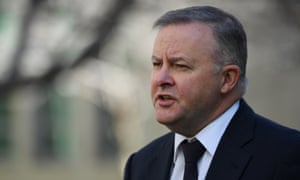Extract from The Guardian
Labor frontbencher uses speech to spell out broad-ranging vision urging party to ‘stick to our values’
Anthony Albanese
has laid out his own Labor manifesto, declaring the ALP must be the
party of reform, of economic growth, of aspiration, of an empowered
grassroots membership – and a party prepared to be bipartisan in the
national interest.
The Labor frontbencher has taken the opportunity of delivering the Gough Whitlam address on Friday night to articulate his own broad-ranging vision for Labor in 2018, noting the ALP can’t expect to “slide into government off the back of our opponent’s failures” and saying it is not good enough to say to voters “elect us because the other mob are useless”.
The speech, was circulated before its delivery, and contained no direct criticism of Bill Shorten, or of the party’s current policy agenda.
But it said Labor “must be determined to avoid allowing tactics to marginalise strategy” and that the party must “stick to our values and craft responses to the real challenges that affect Australians in their daily lives”.
Albanese said Labor must always be optimistic, and outline “a vision of progress”. He emphatically endorsed the Hawke-Keating reforms of floating the dollar, reducing tariffs “and opening the Australian economy to the world” as the bedrock of 27 years of uninterrupted economic growth.
The Labor frontbencher has taken the opportunity of delivering the Gough Whitlam address on Friday night to articulate his own broad-ranging vision for Labor in 2018, noting the ALP can’t expect to “slide into government off the back of our opponent’s failures” and saying it is not good enough to say to voters “elect us because the other mob are useless”.
The speech, was circulated before its delivery, and contained no direct criticism of Bill Shorten, or of the party’s current policy agenda.
But it said Labor “must be determined to avoid allowing tactics to marginalise strategy” and that the party must “stick to our values and craft responses to the real challenges that affect Australians in their daily lives”.
Albanese said Labor must always be optimistic, and outline “a vision of progress”. He emphatically endorsed the Hawke-Keating reforms of floating the dollar, reducing tariffs “and opening the Australian economy to the world” as the bedrock of 27 years of uninterrupted economic growth.
Albanese said Labor had to recognise that it could not stop change, whether it was demographic, technological, or societal, and it could only manage change in the national interest. He said the objective had to be bringing “the community on the journey, rather than pander[ing] to fear of change”.
He also noted that many national policy challenges – climate change, education and infrastructure – “would be best solved by bipartisanship” rather than rolling tit-for-tat, but in calling for more constructive engagement, he noted the Turnbull government “can barely achieve bipartisanship within their own Coalition and are not capable of the magnanimous generosity that bipartisanship requires”.
He said successful Labor governments had always collaborated with the business sector, civil society and the trade union movement.
Albanese said Labor must always “cherish” its historical links with unions, but he warned the party also had to understand that Whitlam’s reforms allowed generations of Australians from working class backgrounds to attend university, “work in the professions and non-unionised industries, or start their own business”.
“We cannot afford to ignore this demographic,” he said, noting that many people were no longer union members.
With the union movement in a full throated campaign to change the rules, in part directed at shaping policy outcomes at the ALP national conference in December, Albanese noted: “This is not 1950, when most Australians were members of trade unions.”
In a provocation to Shorten’s right faction, Albanese backed party reform – saying grass roots members must be given more direct say in elections for public office and internal positions, and “maintain our internal processes that emphasise policy making from the bottom up”.
He noted that the successful push to legalise marriage equality came from the community “and made its way up through the party and ultimately through parliament and into law”.
Albanese also put a toe in the water before a debate about refugee policy expected at the national conference, noting “you can protect our borders without losing our national soul”.
“No mainstream politician believes in open borders, but a policy that uses its prolonged treatment of detained people as an ongoing deterrent to others has a deep flaw at its heart.”
He ended his contribution by declaring Labor was “not a grab bag of ugly neo-cons, weak liberals and agrarian socialists fighting like cats in a bag.
“We are not a single issue party that puts abstract policy ahead of the working lives of people. We are not bitter, frightened xenophobes.
“As Gough Whitlam understood, if changing lives for the better is your ambition, Labor remains the only game in town, the party of mainstream Australia, the party of courage and ambition for our nation, the party of the fair go.”

No comments:
Post a Comment